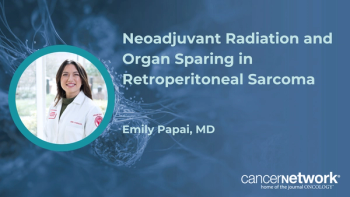
Stephen V. Liu, MD, Discussed the Importance of Testing for Oncogenic Drivers in Frontline NSCLC
CancerNetwork® sat down with Stephen V. Liu, MD, at the 2021 American Society of Clinical Oncology Annual Meeting to talk about pralsetinib for patients with non–small cell lung cancer harboring RET fusions and adequate biomarker testing in the frontline.
At the 2021 American Society of Clinical Oncology Annual Meeting, CancerNetwork® spoke with Stephen V. Liu, MD, regarding his poster presentation of the phase 1/2 ARROW trial (NCT03037385) featuring pralsetinib (Gavreto) in patients with RET fusion–positive non–small cell lung cancer (NSCLC) who are receiving treatment in the frontline setting.
In addition to efficacy data for pralsetinib in this indication, the data served to inform clinicians about the importance of genomic testing in the first line for patients with NSCLC, Liu said.
Transcript:
When we see these high response rates—88% [with pralsetinib]—for relatively rare subsets of lung cancer, it reminds us that it is increasingly critical to be sure we’re testing patients’ cancers appropriately and thoroughly. Now we have drugs that are real difference makers, not just in this subset [with RET fusions], but many others. It’s only possible if we identify the mutations and fusions so we can afford patients those benefits. I think it would be tragic for this option to go unused for someone with RET fusion–positive lung cancer because the cancer hadn’t been adequately tested.
It’s more important these days because the alternative therapy is immunotherapy in some form or another, which is not really an effective treatment for RET fusion–positive lung cancer. If we miss this biomarker, if we do incomplete testing, or skip some markers, we missed the opportunity to give a well-tolerated, extremely effective oral therapy. Instead, we give an expensive immunotherapy agent that is very unlikely to work. It’s very important we find these alterations—if we’re not testing for [RET fusions then we] can’t find them. If you’re not doing complete testing, then it really is difficult to give the proper treatment for patients with lung cancer.
References
Curigliano G, Gainor JF, Greisinger F, et al. Safety and efficacy of pralsetinib in patients with advanced RET fusion-positive non-small cell lung cancer: Update from the ARROW trial. J Clin Oncol. 2021;39(suppl 15):9089. doi:10.1200/JCO.2021.39.15_suppl.9089
Newsletter
Stay up to date on recent advances in the multidisciplinary approach to cancer.







































